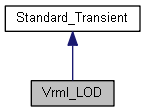defines a LOD (level of detailization) node of VRML specifying properties of geometry and its appearance. This group node is used to allow applications to switch between various representations of objects automatically. The children of this node typically represent the same object or objects at the varying of Levels Of Detail (LOD), from highest detail to lowest. More...
#include <Vrml_LOD.hxx>

Public Member Functions | |
| Vrml_LOD () | |
| Vrml_LOD (const Handle< TColStd_HArray1OfReal > &aRange, const gp_Vec &aCenter) | |
| void | SetRange (const Handle< TColStd_HArray1OfReal > &aRange) |
| Handle< TColStd_HArray1OfReal > | Range () const |
| void | SetCenter (const gp_Vec &aCenter) |
| gp_Vec | Center () const |
| Standard_OStream & | Print (Standard_OStream &anOStream) const |
 Public Member Functions inherited from Standard_Transient Public Member Functions inherited from Standard_Transient | |
| Standard_Transient () | |
| Empty constructor. More... | |
| Standard_Transient (const Standard_Transient &) | |
| Copy constructor – does nothing. More... | |
| Standard_Transient & | operator= (const Standard_Transient &) |
| Assignment operator, needed to avoid copying reference counter. More... | |
| virtual | ~Standard_Transient () |
| Destructor must be virtual. More... | |
| virtual void | Delete () const |
| Memory deallocator for transient classes. More... | |
| virtual const opencascade::handle< Standard_Type > & | DynamicType () const |
| Returns a type descriptor about this object. More... | |
| Standard_Boolean | IsInstance (const opencascade::handle< Standard_Type > &theType) const |
| Returns a true value if this is an instance of Type. More... | |
| Standard_Boolean | IsInstance (const Standard_CString theTypeName) const |
| Returns a true value if this is an instance of TypeName. More... | |
| Standard_Boolean | IsKind (const opencascade::handle< Standard_Type > &theType) const |
| Returns true if this is an instance of Type or an instance of any class that inherits from Type. Note that multiple inheritance is not supported by OCCT RTTI mechanism. More... | |
| Standard_Boolean | IsKind (const Standard_CString theTypeName) const |
| Returns true if this is an instance of TypeName or an instance of any class that inherits from TypeName. Note that multiple inheritance is not supported by OCCT RTTI mechanism. More... | |
| Standard_Transient * | This () const |
| Returns non-const pointer to this object (like const_cast). For protection against creating handle to objects allocated in stack or call from constructor, it will raise exception Standard_ProgramError if reference counter is zero. More... | |
| Standard_Integer | GetRefCount () const |
| Get the reference counter of this object. More... | |
| void | IncrementRefCounter () const |
| Increments the reference counter of this object. More... | |
| Standard_Integer | DecrementRefCounter () const |
| Decrements the reference counter of this object; returns the decremented value. More... | |
Additional Inherited Members | |
 Public Types inherited from Standard_Transient Public Types inherited from Standard_Transient | |
| typedef void | base_type |
| Returns a type descriptor about this object. More... | |
 Static Public Member Functions inherited from Standard_Transient Static Public Member Functions inherited from Standard_Transient | |
| static const char * | get_type_name () |
| Returns a type descriptor about this object. More... | |
| static const opencascade::handle< Standard_Type > & | get_type_descriptor () |
| Returns type descriptor of Standard_Transient class. More... | |
Detailed Description
defines a LOD (level of detailization) node of VRML specifying properties of geometry and its appearance. This group node is used to allow applications to switch between various representations of objects automatically. The children of this node typically represent the same object or objects at the varying of Levels Of Detail (LOD), from highest detail to lowest.
The specified center point of the LOD is transformed by current transformation into world space, and yhe distancefrom the transformed center to the world-space eye point is calculated. If thedistance is less than the first value in the ranges array, than the first child of the LOD group is drawn. If between the first and second values in the range array, the second child is drawn, etc. If there are N values in the range array, the LOD group should have N+1 children. Specifying too few children will result in the last child being used repeatedly for the lowest lewels of detail; if too many children are specified, the extra children w ll be ignored. Each value in the ranges array should be greater than the previous value, otherwise results are undefined.
Constructor & Destructor Documentation
◆ Vrml_LOD() [1/2]
| Vrml_LOD::Vrml_LOD | ( | ) |
◆ Vrml_LOD() [2/2]
Member Function Documentation
◆ Center()
| gp_Vec Vrml_LOD::Center | ( | ) | const |
◆ Print()
| Standard_OStream& Vrml_LOD::Print | ( | Standard_OStream & | anOStream | ) | const |
◆ Range()
| Handle< TColStd_HArray1OfReal > Vrml_LOD::Range | ( | ) | const |
◆ SetCenter()
| void Vrml_LOD::SetCenter | ( | const gp_Vec & | aCenter | ) |
◆ SetRange()
| void Vrml_LOD::SetRange | ( | const Handle< TColStd_HArray1OfReal > & | aRange | ) |
The documentation for this class was generated from the following file:
 1.8.13
1.8.13